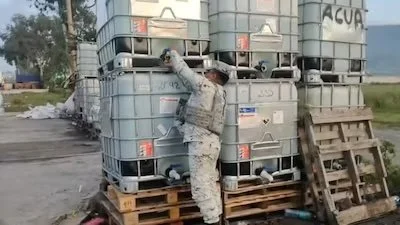52,000 illegal water operations found in Mexico
Mexico Federal Water Board Conagua identified 52,000 irregular water concessions nationwide.
Permits meant for agriculture diverted to real estate, golf courses, and spas.
Illegal wells supplied up to 300 water trucks daily in some states.
Federal program launched to help farmers regularize titles.
Authorities recovered 4 billion cubic meters of water so far.
Mexico’s National Water Commission (Conagua) has uncovered more than 52,000 irregular water concessions across the country, exposing a vast network of “huachicoleo” — the illegal diversion of water resources. Officials say the fraudulent use of permits, originally granted for agricultural purposes, has redirected millions of cubic meters of water toward private real estate developments, golf courses, luxury spas, and other non-agricultural uses, depriving farmers and rural communities of vital supplies.
The findings come from a detailed review of 536,000 files in Conagua’s national water rights registry, where investigators uncovered systematic abuse. Officials say concessions had either expired, been granted with false geographic coordinates, or were otherwise manipulated to disguise illegal pumping and diversion.
“We have detected a massive irregularity in how water rights have been used in Mexico,” said Mauricio Rodríguez Alonso, Conagua’s Subdirector of Water Administration. “Permits that should have been helping farmers irrigate their crops have been diverted to serve commercial interests that were never authorized.”
Illegal Wells Fueling a Shadow Market
The scale of the operation is striking. In states such as Chihuahua, Guanajuato, the State of Mexico, and Michoacán, investigators found illegal wells producing enough water to fill up to 300 tanker trucks every day. Much of this water was reportedly sold into a shadow market supplying urban centers, industrial parks, and private facilities.
One high-profile case involves former Chihuahua governor César Duarte, whose ranch was found to contain an illegal dam diverting water away from surrounding communities. Conagua says it is also scrutinizing major private companies and well-known figures suspected of profiting from illegal water use.
To detect abuses, authorities have turned to satellite imagery and geographic information systems to confirm whether land listed in concession permits is actually being used for agriculture. Early results suggest that large portions of supposedly irrigated farmland are either unused or occupied by real estate projects.
Efforts to Regularize and Recover
In response to the widespread abuse, the federal government has launched a program to help farmers regularize their titles, ensuring they maintain access to irrigation systems and federal subsidies. Officials say campesinos with expired or irregular permits are being given a window to bring their concessions into compliance, protecting them from cancellation.
Conagua has so far reported the recovery of nearly four billion cubic meters of water through administrative actions, voluntary returns of unused rights, and modernization projects in irrigation districts. Authorities emphasize that the campaign is aimed not only at punishing offenders but also at reinforcing the principle of water as a human right in Mexico.
Broader Water Crisis
The revelations come at a critical moment for Mexico’s water policy. Severe droughts in recent years have highlighted the country’s vulnerability to climate change, while urban expansion and industrial demand continue to strain aquifers. With two-thirds of concessions granted to agriculture, competition for resources is intensifying, and illegal exploitation further undermines already fragile supplies.
Experts say the findings underscore the need for stronger oversight. For decades, Conagua has been criticized for lacking the personnel and resources to effectively monitor water rights across Mexico’s vast territory. The agency now promises to consolidate its databases, increase inspections, and open new channels for citizen complaints, including an online portal where abuses can be reported.
Rodríguez Alonso insists the reforms will have long-term impact. “We are not just closing wells,” he said. “We are working to modernize the system, recover resources, and ensure that water remains accessible to those who need it most.”
What’s Next
As Conagua’s investigations expand, more irregular concessions are expected to be canceled. The challenge for the government will be balancing enforcement against powerful political and business interests while safeguarding the livelihoods of small farmers. The success of the regularization program could prove crucial in determining whether Mexico can reduce illegal exploitation and restore public trust in water governance.
For now, the discovery of more than 52,000 irregular concessions offers a stark reminder of how far-reaching the water crisis has become — and how urgently Mexico needs to protect one of its most essential resources.





